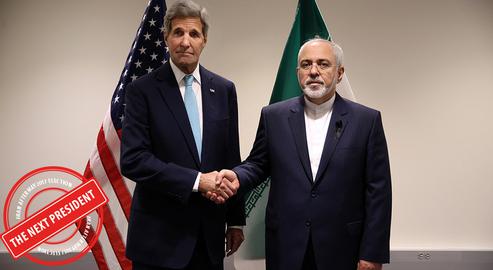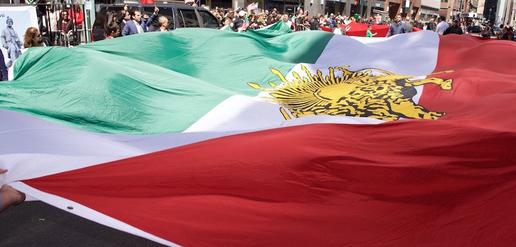Iran’s presidential election is only weeks away, so the country’s most contentious issues are being widely debated and analyzed — from the economy to international relations. Among the most widely discussed is the nuclear deal and its possible fate after the election.
Although candidates have diverse opinions on the Joint Comprehensive Plan of Action (JCPOA), it is believed that the nuclear agreement will stay intact. Iran’s Supreme Leader Ayatollah Khamanei is the main decision-maker when it comes to the nuclear issue, and despite his criticism of many details of the deal, the Leader does not seem to be ready to dismantle the agreement or to clash seriously with the United States.
There is a range of evidence to support this assumption. For example, On October 15, 2015, Ayatollah Khamenei wrote a public letter to President Rouhani to officially approve the implementation of the JCPOA. In this letter, he gave him explicit instructions that if Western powers imposed new sanctions on Iran – including with respect to human rights or terrorism — the implementation of the agreement should be halted with immediate effect. Later, the US did impose new sanctions on Iran, but Mr. Khamenei did not halt the implementation of the JCPOA.
In fact, when the US Congress extended its Iran Sanctions Act for 10 years in late 2016, Ayatollah Khamenei said: "If this sanction is implemented, this is definitely a violation of the [nuclear] agreement...And they should know that the Islamic Republic will definitely react against it." Yet Iran’s government took no action beyond criticizing the move, and Khamenei did not pursue the matter any further. When, in February 2017, the new Trump administration imposed sanctions on 12 companies and 13 individuals connected to Iran’s missile program, the Leader refrained from mentioning the JCPOA altogether. Instead, he said Iran would not be frightened by Trump’s threats, and he thanked the new US president since “he saved us the trouble of revealing the true nature of America.”
Learning Lessons
During the campaign for the 2013 presidential election, one of Hassan Rouhani’s major promises was to solve economic problems by reaching new terms with the West. “It is good that centrifuges are working but people’s lives must work as well,” he said in a debate with one of his competitors, Saeed Jalili, who was Iran’s chief nuclear negotiator under former president Mahmoud Ahmadinejad.
When Rouhani became president and nuclear negotiations were in progress, Ayatollah Khamenei repeatedly warned that the US would continue its pressure on Iran, and that the sanctions would not really end, regardless of what ensued from the talks. On the other hand, the Leader said he would not stand in the way of Iran’s nuclear negotiators. Instead, he predicted that that the outcome of the negotiations with the US would be an important “lesson” for those who had put their faith in the talks, adding that it would demonstrate that reducing tensions with America would not resolve Iran’s problems.
Since the JCPOA went into effect, Iranian hardliners have repeatedly said that the real outcome of this agreement has proved that the Leader’s “prediction” was correct. They emphasize that Iran still faces very serious problems when it comes to banking transactions and international investments, and that the US is still seeking to impose new sanctions on Iran’s economy.
Now, on the eve of a new presidential election, officials close to Ayatollah Khamenei — from Khamenei-appointed Friday Prayers leaders to military generals —focus on the “mistake” Rouhani’s administration made in “trusting” the United States. Media outlets loyal to Khamenei and his allies cite continuing economic problems, including high unemployment rates and recession in Iran’s industry sector, as further proof that the nuclear agreement has not solved Iran’s economic problems as the moderates expected.
The futility of “trusting America,” then, is a regular refrain for hardliner presidential candidates and their supporters. These critics do not seem to be determined to tear up the JCPOA; the chief aim of such criticism is to damage Rouhani's reputation and prevent him from serving another four years as president.
However, various analysis on Iran’s social media outlets show that this kind of propaganda has swayed a considerable number of people who once supported negotiations with the United States and the West — although many still prefer Rouhani to his hardliner rivals.
Not Prepared to Pay “Any Price”
In spite of all the hardliners’ propaganda, Ayatollah Khamenei is apparently well aware of the dangers of violating the JCPOA or seeking a confrontation with Donald Trump’s administration. Khamenei has adopted a softer tone when referring to Trump and his administration. For example, in his first public speech of the Iranian new year on March 21, he uttered the word “America” only twice as a target of criticism. In contrast, in a speech on the same occasion in 2013 — on the eve of the previous presidential election — he specifically attacked America 66 times.
In fact, despite his harsh rhetoric, Ayatollah Khamenei has never really sought serious confrontation with the US. Even when Iran was feverishly busy expanding its uranium enrichment capabilities in defiance of international sanctions, he was not ready to pursue the nuclear program at “any price.”
There is substantial evidence that at the time, President Ahmadinejad’s administration was also unwilling to champion the nuclear program regardless of consequences. In fact, his aggressive approach in pursuing the nuclear program was apparently the result of his wrong belief in the limited risks of pursuing it. In its early days, Ahmadinejad’s administration was confident that the International Atomic Energy Agency would not refer Iran’s nuclear program to the UN Security Council. When it did, Ahmadinejad and his officials were under the impression that China and Russia would veto any harsh sanctions against Iran. Then, when no veto was cast, they were confident that the new sanctions would not be any harsher than the old ones. And, after unprecedented sanctions on oil exports and the banking sector were imposed, Ahmadinejad had no doubt that his government would successfully bypass them.
Bolstered by this, Ayatollah Khamenei confidently repeated throughout Ahmadinejad’s presidency that sanctions would not have a noticeable impact on the Iranian economy. Even after sanctions were intensified, he repeatedly emphasized that he was sure Iran would find a way to bypass the sanctions.
It was only after major oil exports stopped and Iran’s international financial transactions came to a standstill that Ayatollah Khamenei came to realize that the cost of the nuclear program was much higher than what had first been predicted. So he slowly came around to confessing that Iran was losing out — of course, in his own defiant way. For example, during his new year speech in March 2013 shortly before the presidential election, he openly admitted that sanctions had really affected Iran’s economy, adding “If they [the Americans] want to be happy [of the Leader’s confession] let them be so.”
When Iranian leaders discovered they could not control the adverse consequences of the sanctions, the regime took the decision to negotiate publicly and directly with the US government, and to retreat from its nuclear programs — two issues that previously had been labeled as “red lines” not to be crossed.
The Credibility Quandary
Today, the same mindset seems to be in place. Iranian authorities worry about the high costs of a possible confrontation with Donald Trump’s administration, which has promised to take a much tougher approach toward Iran than the Obama administration did. These authorities, of course, insist that they will react if Iran is attacked — and most probably would do so. But they would most certainly prefer to avoid such a situation in the first place. Under such circumstances, Ayatollah Khamenei does not want to provide Washington with an “excuse” as far as the nuclear program is concerned. The Leader’s hardline associates, too, have possibly little inclination to take risks when it comes to this specific matter — especially considering the fact that their predictions about the possible costs of Iran’s nuclear program during Ahmadinejad’s administration were proved to be absolutely wrong.
Nonetheless, this does not mean that the Iranian government will ignore any pressure from the United States altogether.
In the short term, hardliners might be happy that the moderates who supported negotiations with the US have lost some credibility. But in the long term, sanctions and pressures from Washington could also discredit Ayatollah Khamenei by portraying him as a weak leader. To keep his standing among his followers, Khamenei needs to project himself as a strong leader, and anything to suggest he is a timid politician who lacks power in the face of American pressure would be a fatal blow to his reputation among his followers.
Ayatollah Khamenei takes Trump’s threat seriously, but if he is repeatedly humiliated over the nuclear agreement, he will be ready to react and even to take risks. With this in mind, if the US continues to impose new sanctions he might order the next Iranian administration — whoever leads it as president —to stop the implementation of the JCPOA, just as he threatened in October 2015.
In addition, if the economic benefits of the nuclear deal fail to materialize, Iranian politics will shift dramatically. Not only would those who support negotiations with the US find themselves discredited, but the very idea of trusting America would disappear from Iran’s political landscape — no matter who runs the government in Washington. This development would not only arise because of pressure from hardliners; it would be a direct response from ordinary citizens who have lost hope that improved relations with the US can lead to economic improvement. From then on, those candidates most hostile to the US would find it easier to win elections.
So what can be done?
Taking into account the present realities, the international community must leave the leaders of the Islamic Republic with no doubt that if it violates the terms of the JCPOA, it will be met with a very harsh response. And Iranian authorities must not come to the conclusion that the JCPOA makes no difference to Iran’s economic situation.
The Islamic Republic will adhere to 100 percent of its nuclear obligations if the dire consequence of violating the JCPOA are very clear to Ayatollah Khamenei; at the same time, the international community must be careful not to destroy the Leader’s credibility among his supporters by trying to portray him as a politician who submits to US pressure without any pushback.
Experience has shown that Iran’s Supreme Leader will give serious concessions if and only if he is certain he has no other option, and as long as there is still a possibility for him to adopt a face-saving compromise.
visit the accountability section
In this section of Iran Wire, you can contact the officials and launch your campaign for various problems

























comments